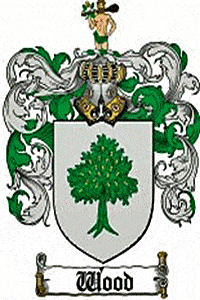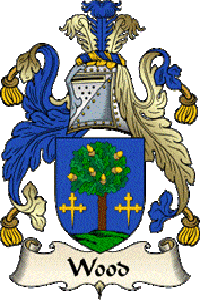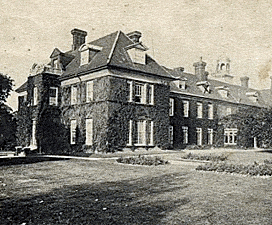The Wood Surname predates the 7th century, broadly originating in England, Scotland, and Wales, with etymologies derived from Olde English, Norman French, and Scottish. The General Armory of England includes 104 coats of arms for the Wood surname, which reflects its prevalence and frequency in medieval records. While symbols on these coats of arms are diverse, reflecting the character and attributes of locality, the image of a tree is common. Matching the right branch of the Wood surname to its correct coat of arms can be tricky, and not every branch of the Wood surname has its own coat of arms.
The Wood surname has at least nineteen mottoes associated with it, including themes such as Defend, Perseverance, and Valor. The image of a caveman is used to covey prowess in battle. On these coats of arms, the symbols of a tree combined with a caveman denote a brave family living or working near a forest.
Stories about the origins of the surname Wood are diverse and creative, often retold online without attribution. A few stories, however, rise to the top. One story recounts how the Wood family of Dumfriesshire traces its line back to a Norman Knight who, after losing his knight’s fief in England, relocated to Scotland ca. 1150 AD. Another argument links the surname Wood to De Silva of Suffolk, who appears in Domesday in 1086 AD. Silva is the Latin word for forest.
The protagonist of yet another explanation is Emald de Bosco (1120-1173), a Norman Knight and companion of William the Conqueror, whose surname might have been latinized into English as Wood. The coat of arms of the De Bosco family, as one would expect, features a tree. In 1153, Emald de Bosco received the mandate to become “justice of the forest on this side of Trent,” which meant de Bosco was perfectly named to be the manager of a forest. Bosco in Norman French is Vosco, the antecedent of the modern French surnames Bois or Dubois.
Immigrants to Ireland from England translated Wood into Gaelic as Coll or Coill. The stories of the Wood surname in Ireland are those of hopes and sorrows that precipitated relocation.






 After 1250, the surname Wood is found on the Hundreds Rolls and in parish registers. A sampling of early but incomplete occurrences include:
After 1250, the surname Wood is found on the Hundreds Rolls and in parish registers. A sampling of early but incomplete occurrences include: Woods” outnumber those named “Wood” by about ten to one. As the two surnames are easily confused, records show that they have been, on occasion, used interchangeably. Typically, those in Ireland with the surname Wood are settlers from England, such as the Wood families residing in the counties of Meath, Kildare and Dublin. These Wood families arrived in Ireland from Yorkshire during the 17th century.
Woods” outnumber those named “Wood” by about ten to one. As the two surnames are easily confused, records show that they have been, on occasion, used interchangeably. Typically, those in Ireland with the surname Wood are settlers from England, such as the Wood families residing in the counties of Meath, Kildare and Dublin. These Wood families arrived in Ireland from Yorkshire during the 17th century.